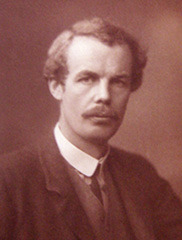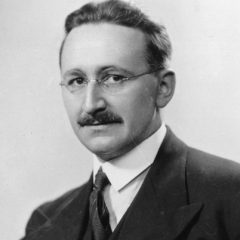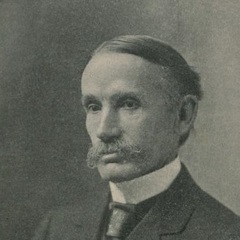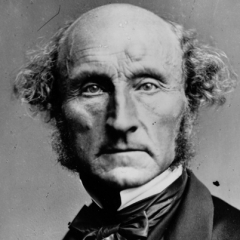Alfred Marshall quotes
-
“The most valuable of all capital is that invested in human beings”
-- Alfred MarshallSource : Alfred Marshall (2009). “Principles of Economics: Unabridged Eighth Edition”, p.469, Cosimo, Inc.
-
“Civilized countries generally adopt gold or silver or both as money.”
-- Alfred MarshallSource : Alfred Marshall (2009). “Principles of Economics: Unabridged Eighth Edition”, p.51, Cosimo, Inc.
-
“In common use almost every word has many shades of meaning, and therefore needs to be interpreted by the context.”
-- Alfred MarshallSource : Alfred Marshall (1977). “Principles of Economics: An Introductory Volume”
-
“Capital is that part of wealth which is devoted to obtaining further wealth.”
-- Alfred MarshallSource : Alfred Marshall, Mary Paley Marshall (1888). “The Economics of Industry”
-
-
“In every age poets and social reformers have tried to stimulate the people of their own time to a nobler life by enchanting stories of the virtues of the heroes of old.”
-- Alfred Marshall -
“Knowledge is our most powerful engine of production.”
-- Alfred MarshallSource : Alfred Marshall (2009). “Principles of Economics: Unabridged Eighth Edition”, p.115, Cosimo, Inc.
-
“Every short statement about economics is misleading (with the possible exception of my present one).”
-- Alfred Marshall -
“It is common to distinguish necessaries, comforts, and luxuries; the first class including all things required to meet wants which must be satisfied, while the latter consist of things that meet wants of a less urgent character.”
-- Alfred MarshallSource : Alfred Marshall (1997). “Principles of Economics”
-
-
“Material goods consist of useful material things, and of all rights to hold, or use, or derive benefits from material things, or to receive them at a future time.”
-- Alfred MarshallSource : Alfred Marshall (2010). “Principles of Economics”, p.54, Cosimo, Inc.
-
“Again, most of the chief distinctions marked by economic terms are differences not of kind but of degree.”
-- Alfred Marshall -
“Producer's Surplus is a convenient name for the genus of which the rent of land is the leading species.”
-- Alfred MarshallSource : Alfred Marshall, Peter Groenewegen (1997). “Collected works”
-
“Individual and national rights to wealth rest on the basis of civil and international law, or at least of custom that has the force of law.”
-- Alfred MarshallSource : Alfred Marshall (1890). “Principles of Economics”
-
-
“Slavery was regarded by Aristotle as an ordinance of nature, and so probably was it by the slaves themselves in olden time.”
-- Alfred MarshallSource : Alfred Marshall (2010). “Principles of Economics”, p.3, Cosimo, Inc.
-
“In the absence of any short term in common use to represent all desirable things, or things that satisfy human wants, we may use the term Goods for that purpose.”
-- Alfred Marshall -
“I admit that these terms and the diagrams connected with them repel some readers, and fill others with the vain imagination that they have mastered difficult economics problems, when really they have done little more than learn the language in which parts of those problems can be expressed, and the machinery by which they can be handled. When the actual conditions of particular problems have not been studied, such knowledge is little better than a derrick for sinking oil-wells erected where there are no oil-bearing strata.”
-- Alfred Marshall -
“We might as well reasonably dispute whether it is the upper or the under blade of a pair of scissors that cuts a piece of paper, as whether value is governed by demand or supply.”
-- Alfred MarshallSource : Alfred Marshall (2009). “Principles of Economics: Unabridged Eighth Edition”, p.290, Cosimo, Inc.
-
-
“The hope that poverty and ignorance may gradually be extinguished derives indeed much support from the steady progress of the working classes during the 19th century.”
-- Alfred MarshallSource : Alfred Marshall (1977). “Principles of Economics: An Introductory Volume”
-
“All labour is directed towards producing some effect.”
-- Alfred MarshallSource : Alfred Marshall (2010). “Principles of Economics”, p.65, Cosimo, Inc.
-
“All wealth consists of desirable things; that is, things which satisfy human wants directly or indirectly: but not all desirable things are reckoned as wealth.”
-- Alfred MarshallSource : Alfred Marshall (2009). “Principles of Economics: Unabridged Eighth Edition”, p.45, Cosimo, Inc.
-
“And very often the influence exerted on a person's character by the amount of his income is hardly less, if it is less, than that exerted by the way in which it is earned.”
-- Alfred MarshallSource : Alfred Marshall (2006). “Elements of Economics of Industry: Being the First Volume of Elements of Economics”, p.2, Cosimo, Inc.
-
-
“But if inventions have increased man's power over nature very much, then the real value of money is better measured for some purposes in labour than in commodities.”
-- Alfred MarshallSource : Alfred Marshall (2010). “Principles of Economics”, p.62, Cosimo, Inc.
-
“Consumption may be regarded as negative production.”
-- Alfred MarshallSource : Alfred Marshall (2010). “Principles of Economics”, p.64, Cosimo, Inc.
-
“The price of every thing rises and falls from time to time and place to place; and with every such change the purchasing power of money changes so far as that thing goes.”
-- Alfred MarshallSource : Alfred Marshall (2009). “Principles of Economics: Unabridged Eighth Edition”, p.51, Cosimo, Inc.
You may also like:
-
Adam Smith
Philosopher -
Arthur Cecil Pigou
Economist -
Carl Menger
Economist -
David Ricardo
Economist -
Francois Quesnay
Economist -
Friedrich August von Hayek
Economist -
Irving Fisher
Economist -
Jean-Baptiste Say
Economist -
John Bates Clark
Economist -
John Maynard Keynes
Economist -
John Stuart Mill
Philosopher -
Joseph A. Schumpeter
Economist -
Karl Marx
Philosopher -
Lionel Robbins, Baron Robbins
Economist -
Milton Friedman
Economist -
Paul Samuelson
Economist -
Sir John Richard Hicks
Economist -
Thomas Malthus
Scholar -
Vilfredo Pareto
Economist -
William Stanley Jevons
Economist



















